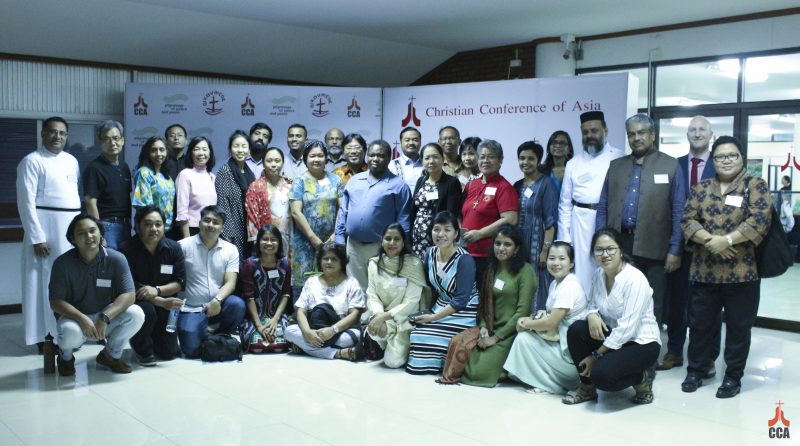Churches in Asia need to combat sexual abuse and exploitation of children, affirm participants of CCA-WCC Consultation
 Participants of the Asia Regional Consultation at the CCA Headquarters in Chiang Mai, Thailand
Participants of the Asia Regional Consultation at the CCA Headquarters in Chiang Mai, Thailand
CHIANG MAI, Thailand: About forty child rights activists and representatives of churches as well as organizations working on the rights and dignity of children from various countries and regions across Asia affirmed the need to combat sexual abuse and exploitation of children, and committed to sensitize churches in Asia to be engaged in child rights advocacy.
Held at the headquarters of the Christian Conference of Asia (CCA) from 13-16 October 2019 in Chiang Mai, the Asia Regional Consultation on ‘Child Rights Protection and Advocacy to Combat Sexual Abuse and Exploitation’ was organized by the CCA in collaboration with the World Council of Churches (WCC).
In his opening address, CCA General Secretary Dr. Mathews George Chunakara spoke about the continued efforts of CCA and WCC over the years to highlight the need of upholding the dignity of children and protecting their rights.
“CCA and WCC jointly initiated this consultation with the aim to sensitize the member churches and member councils and to also find ways to collaborate with wider bodies operating in the secular framework. Another important aim is to identify the role of the church and other faith-based organizations in strengthening collective efforts for advocacy against sexual abuse and exploitation of children”, said Dr. Mathews George Chunakara.
He explained that the Asia Advocacy Network on Dignity and Rights of Children (AANDRoC), a regional advocacy platform initiated by CCA, had been trying to mobilise CCA’s member churches and member councils and enable them to be involved in advocacy not only at the church level but beyond the church circles into wider society, and also extend their advocacy to the regional, national and even the international level through UN mechanisms.
In a session on ‘Our Commitment to Upholding and Protecting the Dignity and Rights of Children’, Masimba Kuchera (Zimbabwe), a member of the Commission of Churches on International Affairs of the WCC said, “In most cases, we do not give children an opportunity to speak and because of that, they are also not given the opportunity to hear out loud what they want to say. So part of the church’s commitment to children is to help the children’s voices come out. In order to maintain the dignity of children, we need to hear their voice - not their voice through us but their voice through themselves.”
Kuchera said, “When they are given the voice to speak, we initiate a relationship with them where they feel secure enough to open up and share their feelings. Our commitment should get us to a point where we can create an environment where the children can speak for themselves and feel secure doing so”.
He further added, “Our involvement is at the level of the church but the church doesn’t exist in a vacuum – the church provides a moral compass to society and if the church is silent, that compass disappears. The church has an obligation to make sure that we continue to be at the forefront of championing children’s rights and making sure we end bad practices, especially violence against children”.
Thomas Muller from ECPAT International spoke on ‘Protection of Children from Sexual Abuse and Exploitation’ and highlighted the various ways children all over the world and especially in Asia are exploited. He also called for collective action to tackle this issue because “we cannot do it alone”. He urged for things to be said the way they are and not diminish or change the meaning. He focused particularly on sexual exploitation in travel and tourism, and online child sexual exploitation in the Asian context.
Muller reiterated that there was no typical offender and offenders could be found everywhere. He also touched upon the victimization of the victim and said, “Society always has the focus on the perpetrators and only wants to get them off the streets. The victim acts as a stepping stone to the perpetrators. The approach and focus need to be changed radically so as to be victim-centered”.
Muller further opined, “If the church takes leadership in ending the child exploitation in volunteering and mission efforts, it would send a strong signal across the entire sector”.
Grace C. Agcaoili of the UNICEF spoke on the legal frameworks, mechanisms, and tools for the protection of children.
When talking about collaborating with religious communities, she mentioned that religious communities had almost 5 billion members in the world and their potential for action was great. With their moral influence, churches could influence thinking, foster dialogue and set priorities for members of their communities; they could offer a variety of networks for the care and protection of children and the safeguarding of their rights.
The Child Protection Specialist of UNICEF East Asia and the Pacific Regional Office urged the participants, “When a child tells you something, the first instinct must be to trust the child. Very few children can manufacture details of incidents of this nature and we must be careful in our response to the child”.
Ajit Hazra from the World Vision International opined, “We need to approach the situation of children and advocacy on their rights from an angle that is not solely a problem of Christians but of the entire community; therefore we need to find ways to pool our resources together irrespective of faiths or ideologies.”
Country and regional presentations on Child Rights Protection Situation as well as Best Practices that were in place in different national and regional contexts were shared by participants.
The consultation adopted a communique and plans for follow-up actions and advocacy in the future.










